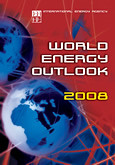 The recent International Energy Agency “World Energy Outlook 2008” report is a mixture of blind optimism and dire warnings. It reads as though it were written by several different authors some of whom see peak oil in sight and others who continue to deny the inevitable.
The recent International Energy Agency “World Energy Outlook 2008” report is a mixture of blind optimism and dire warnings. It reads as though it were written by several different authors some of whom see peak oil in sight and others who continue to deny the inevitable.
Even the IEA Chief Economist, Dr. Fatih Birol, encourages us to read between the lines. In a recent Energy Bulletin article he was quoted as saying “If you read the report carefully, or run a word search on it, you will see that two words occur more frequently than any others. The first word is “oil”. The second word is “if”.”
Below the fold is a guest post from Duncan Russell analysing the report. You can read my earlier review here.
The international energy agency each year brings out a report, this year it made an in depth look at the world’s oil reserves, and projected from that the future oil production rates. The agency in the past has consistently been one of the most optimistic projectors of oil production.
After looking at the world oil reserves, this year’s report states that the world’s oil fields will start to deplete at a faster rate than previously thought, for oil demand just to stay still we will need to find four new Saudi Arabia’s and to meet projected demand six new Saudi’s will be needed.
Investment in new techniques to increase production and the production of more difficult and expensive oil wells, and tar sands will meet some of this supply. The agency expressed fears that the reduction in the price of oil, due to the world recession, will impacted on this crucial investment.Dr. Birol one of the authors of the report was in Dublin last week, putting the report into an Irish context. He said” Ireland is a very vulnerable country in terms of its reliance on the International oil and gas markets.” Dr Birol called on the governments not to be “slaves” to everyday issues caused by the financial crisis, by addressing the energy challenges facing the world.
He summed up by saying” what is needed is nothing short of an energy revolution. It is no exaggeration to say that the future of human prosperity depends on how we tackle the two energy challenges facing us, the need for a secure and affordable energy supply and a rapid transformation to a low-carbon energy.”
